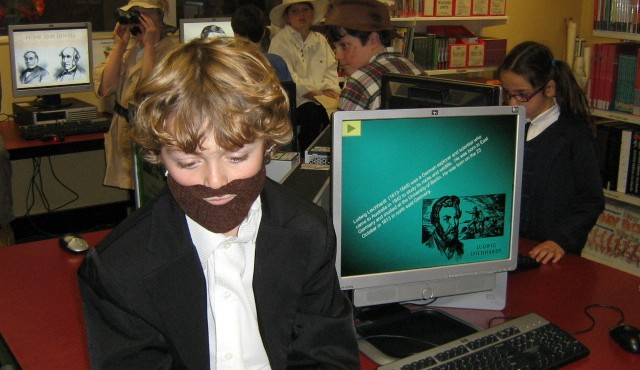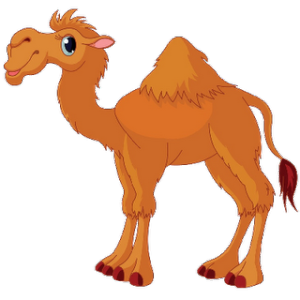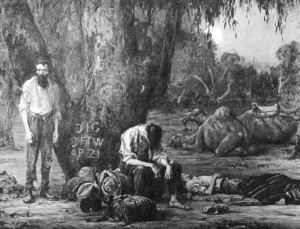It is 1810 and the locals are keen to find out what Australia has to offer beyond Sydney Cove. They are ready to explore and discover what this new land has to offer. History tells us what happened next – the successes and the failures. Imagine if we could go back in time and chat with the explorers before they set off on their expedition. What advice would we give them? What difference could we make to history?
Information research skills, knowledge construction, collaboration and shared decision making will be key skills developed. The unit supports the Stage 3 (NSW) History unit The Australian Colonies.
Overview
Grade: 4-6 Duration: 8 Weeks
Outcomes
The student:
- uses an integrated range of skills, strategies and knowledge to read, view and comprehend a wide range of texts in different media and technologies (EN3-3A )
- recognises, reflects on and assesses their strengths as a learner, in particular their teamwork/collaboration skills (EN3-9E)
- describes and explains different experiences of people living in Australia over time, in particular early Australian explorers (HT3-2)
Skills Focus
21CLD: Main focus areas – Collaboration, Knowledge Construction, ICT for Learning
21CLD Rubric for lesson:21CLD_Capabilities_combined_rubric
Specific Learning Intentions and Assessment Opportunities
Learning Intention 1:
Students will be able to select, navigate and read texts, applying appropriate text processing strategies and interpreting structural features (table of contents, glossary, chapters, headings and subheadings), in order to determine the essential elements for a successful expedition in Australia in the 1800s.
Performance Task:
Students construct a guide for an explorer that will enable them to be more informed about an expedition, and will increase their chance of success.
Success Criteria:
The guide lists behaviours/resources/skills that are relevant and appropriate for an explorer in Australia in the 1800s..
Learning Intention 2:
Discuss and reflect on the roles and responsibilities when working as a member of a group and evaluate the benefits of working collaboratively with peers to achieve a goal.
Performance Task:
As a class. students propose and agree on a class list of ‘norms’
Success Criteria:
The 4 behaviours students record individually are appropriate and relevant. Anecdotal notes on student participation in discussions will be recorded.
Suggested Learning Sequence
Connect and Wonder (2 Lessons)
Discuss what life was like in the 1800’s in Australia. Retell the story of British Colonisation and the settlement of Sydney Cove. Discuss the importance of explorers in the growth of a country.
Lead students through a ‘Pondering‘ task to encourage careful observation and thoughtful interpretations.
- As a whole class students observe the image of Burke and Wills (below) and pose ‘questions’ about what they see. Teacher records questions on a collaborative OneNote page. No-one answers the questions, students are simply given time to just ‘ponder’. Allow time for thinking and deeper questioning. (Read more about ‘Pondering and Wondering’ at http://fno.org/oct05/images.html)
When students have finished pondering discuss questions raised on the collaborative page. Give a brief overview of the Burke and Wills story (LINK to NSW State Library Information) and have students speculate about the reasons why the expedition failed:
- lack of resources?
- limited skills and poor decision making?
- behaviour and attitude of party members?
- hardship faced due to environmental?
Explain to the class that their task is to produce a guide for would-be explorers of the early 1800s, like Burke and Wills. What would you say if you could travel back in time to speak to them? What advice could you give that would increase their chance of a more successful expedition? What have you learned from the successes and failure of other explorers?
Discover and Learn (4 Lessons) – Build your knowledge!
Divide students into mixed ability groups of 4 (known as their party).
Each member of a party will be responsible for researching expeditions that occurred in a given area of Australia during the 1800s.
Expedition areas include:
- Crossing the mountains
- South to north
- East to west
- The river system
As they research and read, each student should carefully consider an explorer’s successes and failures and make inferences on why an explorer succeeded or failed. In particular, can they link the success or failure to a specific issue?:
- skills of the explorers?
- resources (food, tools, clothing, equipment etc)?
- party member’s behaviour?
- impact of environment on expedition?
Students may interact with members from other parties that are researching the same content. This will encourage a sharing of resources and knowledge as well as an opportunity to cross-reference facts and verbalise ideas. * Remind students that they must be an active participant in this shared research format, as they are responsible for reporting back to their group, and they should reference their facts to provide evidence if required.
Before moving on to this research component of the task:
- each party must take time to meet and agree on the information they expect each member to collect, set a timeline, and decide on how information will be recorded. A collaborative OneNote is suggested, however other methods such as shared Word documents may be preferred. The teacher will review plans, offer advice as needed.
- revise with the class, skills for selecting, navigating and reading texts, applying appropriate text processing strategies and interpreting structural features (table of contents, glossary, chapters, headings and subheadings). Revise how to identify ‘key words’ for researching a topic, the use of OPAC catalogue, and the value of primary and secondary sources. Share ideas on how to record notes and jot down ideas. Remind students of the importance of referencing.
To support self regulation, each party should meet at the beginning of each lesson to review progress and check that all members are progressing with the task. If necessary, students can revise plans and targets. Party members should take turns at leading the group discussion and recording changes to their planning.
Support differentiation by providing information of expeditions as podcasts and videos, as well as text, to support students with literacy needs.
Students return to their party to share their findings and identify skills/equipment/behaviours that were common for successful explorers they researched. Students may also present facts about explorers that failed, with suggestions on why they think the explorer failed and how it could have been avoided.
Students reflect upon the information from all members and identify common findings. The party must agree upon and create a list of what they believe are the five most valuable pieces of information they could give an explorer before setting of on an expedition in 1800s in Australia.
To compliment the list, students will consider images and graphs that could be included to improve chances of a successful expedition. Imagine if Burke and Wills had a satellite image of Australia, or a graph showing rainfall and temperatures across the year. What difference might that have made to their expedition and planning? Each party is allowed to add 2 graphic resources.
Create and Share(2 Lessons)
Students present their information in a format of their choice. Students may consider using
- Sway
- PowerPoint
- Office Mix
- Video Recording
- Audio Recoding
- MS Word
Reflect and Rethink
Content: Final lists will be shared with a local Scout Leader or orienteering team to assess the value of their information. Feedback may be used to make changes if desired.
Collaboration: Following the completion of the task, students will individually list the 4 most important behaviours they believe students should demonstrated when working as a part of a group. Students then pair with another person (assigned by teacher) to share their list. The pair must then agree on the 4 behaviours they feel are most valuable. Students form groups of 6, share and agree on 4 behaviours. Finally, groups come together with their list and share the 4 behaviours they believe are the most important for working as a team. As a whole class, agree on the 4 behaviours. Rewrite these as ‘responsibilities’ a person has to a group. Set these as class norms for future tasks.
LINKS
Resources and Extensions Ideas



